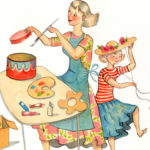
07 Mar Birthday celebrations: A Twin Win Situation
Gina Roberts-Grey explains that double does not necessarily mean trouble when it comes to birthday celebrations.
Having two children share the same birthday puts a strain on more than the budget. Parents and family members of twins know it is not always easy to make sure that each child feels special, unique and remembered on their birthday. Although combined parties tend to work for younger children, as twins grow older they often demonstrate their independence and personal styles, proclaiming, “I want my own party,” “I want to be different from my twin,” or asking, “Why do I have to share my birthday?”
Have you ever contemplated how twins feel about celebrating their birthdays? Would they prefer to share a celebration or plan a party together? Would they be interested in separate parties held in different locations or on different days? Many times, twins receive one big gift to share. They may receive identical gifts in order to eliminate rivalry, whether they both want the same present or not. Twins may have combined birthday parties for a multitude of reasons. There are some twins who do not mind sharing birthdays, gifts and special days with each other, but there are others who take exception to having one party to celebrate two birthdays.
Christine Corona has 10-year-old twins, Matthew and Madison, who correct anyone who says that they have the same birthday or who refers to either of them with a non-gender-specific-sounding nickname such as Matty or Maddy. As Madison explains, “One of us is older and one is younger. We each have our own names, and should have our own birthdays as well.”
Kim Renno is the mother of a seven-year-old girl and twin three-year-old girls. Kim explains, “Because of the expense, clean-up and time needed to organise a party, my twins will not have separate birthday parties”. Planning on hosting one small, combined celebration that includes one or two of each of their friends, Kim intends to keep her twins’ birthday parties low-key as they get older.
Many parents of twins and multiples share this strategy. In an effort to prevent busy family members from having to find the time to attend two separate parties, parents opt for one combined celebration. “There’s a lot of emotional energy and financial expense required to host two parties. It’s much easier to have one day of festivities instead of two,” adds Kim.
In an effort to be fair, Eva Bracher refuses to combine celebrations of special occasions for her twins. The mother of two boys, 11 and three, and identical twin nine-year-old girls, Eva says, “My sons have their own special days, and it’s only fair that the girls do as well.” Taking turns each year, one of Eva’s twins has a birthday party with classmates and friends on the actual day, and the other has a party six months later on her ‘half birthday’. “Of course, they each receive gifts and acknowledgments from our family on their true birthday, but this gives them each the chance to celebrate with their specific friends, in their specific way.”
For years, requesting that relatives give his children one larger gift that they could share was effective for father of twin boys, Terry Wodarski. This limited arguments over who received a bigger or better gift and ensured that both boys enjoyed what they received. “When the boys were almost eight, they informed everyone they wanted separate parties and gifts,” he says. Terry’s sons maturely explained to their friends and relatives that they would like to be recognised separately. “Even though two parties are more work, the boys have such different personalities and interests that now that they’re older, this is actually easier than fighting with them to find a common party theme.”
Although one bigger gift may seem practical, and may be given with the best of intentions, many twins actually prefer receiving individual birthday gifts. They often each want to be the one who opens the gift, or fight over whose turn it is to play with it in the days after their birthday has passed. Even if two gifts are smaller than one large one, twins appreciate the sentiment of a family member recognising each one of them as individuals.
Talking with twins to determine how they feel about having their birthday parties combined can save everyone a great deal of stress and frustration. In the words of Matthew Corona: “As long as both kids know that everyone sees them as two people instead of one, it’ll be a great party”.




